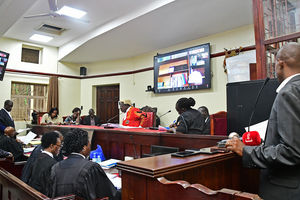
The late Henry Katanga and his wife Molly. PHOTO/FILE
The 6th prosecution witness, Mugabe Ronald Ruranga who claims to have been a transactional lawyer for the late Kampala businessman Henry Katanga, has told the court that the deceased telephoned him requesting to meet him to write a Will a few days before his tragic passing.
Mr Mugabe said because of their clashing schedules, they never met to materialise the Will writing and that on the very fateful day of November 2, 2023, they had planned to meet at 10am but he instead received a depressing phone call at around midday that Katanga had died.
“I received a call from the late Henry Katanga, using a different number and he told me he wanted to see me. I told him I was in Ntinda (one of the Kampala suburbs). My lord, I asked him why he wanted to see me and said he wanted give me some documents,” the witness narrated.
Adding: “I didn't but I came to know later from Naome Nyangweso, the sister of the deceased, that he wanted to make a Will."
In Uganda, anyone above the age of 18 can make a Will, detailing what properties they have but should be of sound mind.
Further in his testimony, the witness also informed the court how the late Katanga had sought to hand to him documents for his lawyering but they never came to meet as he was in Ntinda, a Kampala suburb.
When asked by the Chief State Attorney Jonathan Muwaganya what was contained in those parcels, Mugabe said it was land transaction certificates.
“It was a bag containing an envelope with an original certificate of title, original agreements for the purchase of land, and some stickers showing where he bought the land,” the witness told the court.
However, when it came to the cross-examination session, Mr Mugabe was described as a quack lawyer because his name does not appear on the Advocates Roll, an essential documentation that allows advocates to practice their legal profession in the country.
“There forever, you are not a practicing advocate, and if you are, you are practicing illegally,” Mr MacDusman Kabega, one of the defence lawyers put it to Mugabe.
Mugabe faced a hard time when the defence lawyers induced several land and property transactions without his name being Katanga’s transactional lawyer, contrary to his claims that he was the deceased's, transactional lawyer.
The defence lawyers also adduced several documents showing that Katanga and his wife, Molly (the key suspect in this trial), had several properties that they jointly owned as a couple.
Presiding judge Isaac Muwata has since adjourned the widely publicised trial to August 20 when the late Katanga’s elder sister Naome Nyangweso is expected to take to the witness stand and testify against the five suspects.
Katanga, a wealthy businessman was found dead at his Mbuya residence in Kampala on November 2, last year.
Molly Katanga, the widow, is charged alongside her two daughters Patricia Kakwanza and Martha Nkwanzi.
The duo daughters face a lesser charge of destroying evidence and being an accessory after the act of murder.
The other suspects are Charles Otai, a nursing officer with Bugolobi Medical Centre, and Mr George Amanyire, formerly a shamba boy at the Katangas.









